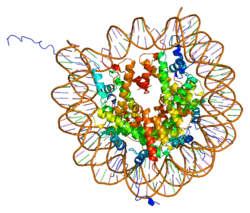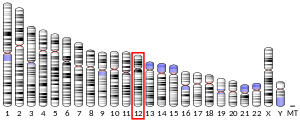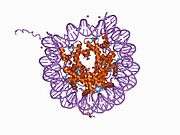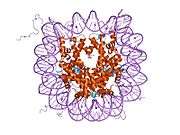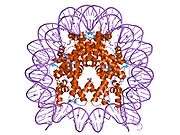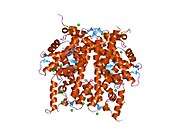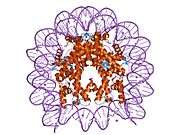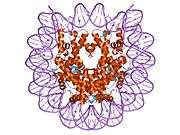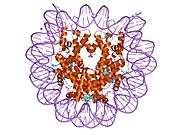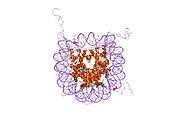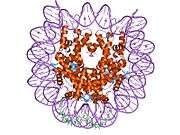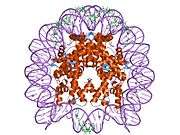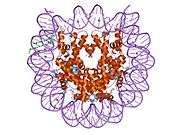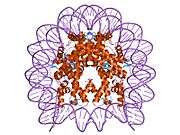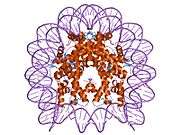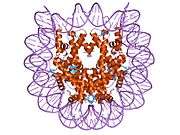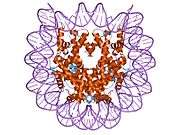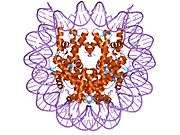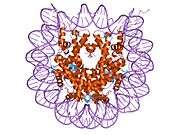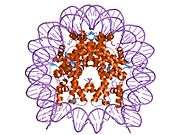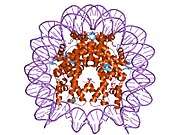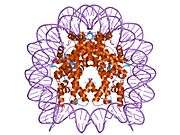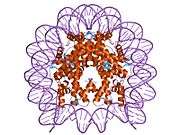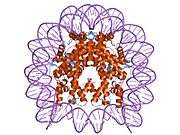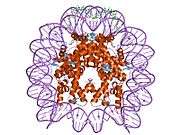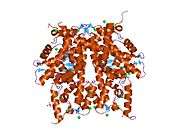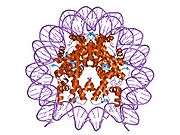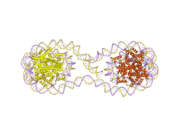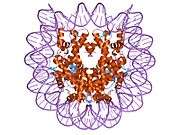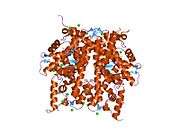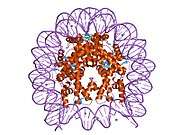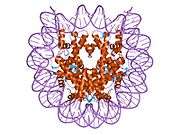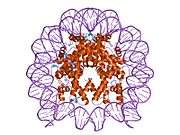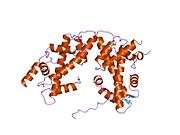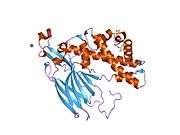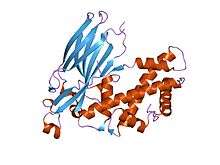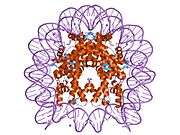HIST4H4
Histone H4 is a protein that in humans is encoded by the HIST4H4 gene.[4]
Histones are basic nuclear proteins that are responsible for the nucleosome structure of the chromosomal fiber in eukaryotes. Nucleosomes consist of approximately 146 bp of DNA wrapped around a histone octamer composed of pairs of each of the four core histones (H2A, H2B, H3, and H4). The chromatin fiber is further compacted through the interaction of a linker histone, H1, with the DNA between the nucleosomes to form higher order chromatin structures. This gene is intronless and encodes a member of the histone H4 family. Transcripts from this gene lack polyA tails; instead, they contain a palindromic termination element.[5]
References
- GRCh38: Ensembl release 89: ENSG00000197837 - Ensembl, May 2017
- "Human PubMed Reference:". National Center for Biotechnology Information, U.S. National Library of Medicine.
- "Mouse PubMed Reference:". National Center for Biotechnology Information, U.S. National Library of Medicine.
- Marzluff WF, Gongidi P, Woods KR, Jin J, Maltais LJ (Oct 2002). "The human and mouse replication-dependent histone genes". Genomics. 80 (5): 487–98. doi:10.1016/S0888-7543(02)96850-3. PMID 12408966.
- "Entrez Gene: HIST4H4 histone cluster 4, H4".
Further reading
- Pauli U, Chrysogelos S, Stein G, et al. (1987). "Protein-DNA interactions in vivo upstream of a cell cycle-regulated human H4 histone gene". Science. 236 (4806): 1308–11. doi:10.1126/science.3035717. PMID 3035717.
- Borowski P, Heiland M, Oehlmann K, et al. (1996). "Non-structural protein 3 of hepatitis C virus inhibits phosphorylation mediated by cAMP-dependent protein kinase". Eur. J. Biochem. 237 (3): 611–8. doi:10.1111/j.1432-1033.1996.0611p.x. PMID 8647104.
- El Kharroubi A, Piras G, Zensen R, Martin MA (1998). "Transcriptional Activation of the Integrated Chromatin-Associated Human Immunodeficiency Virus Type 1 Promoter". Mol. Cell. Biol. 18 (5): 2535–44. doi:10.1128/mcb.18.5.2535. PMC 110633. PMID 9566873.
- Zhang Y, Sun ZW, Iratni R, et al. (1998). "SAP30, a novel protein conserved between human and yeast, is a component of a histone deacetylase complex". Mol. Cell. 1 (7): 1021–31. doi:10.1016/S1097-2765(00)80102-1. PMID 9651585.
- Carrier F, Georgel PT, Pourquier P, et al. (1999). "Gadd45, a p53-Responsive Stress Protein, Modifies DNA Accessibility on Damaged Chromatin". Mol. Cell. Biol. 19 (3): 1673–85. doi:10.1128/MCB.19.3.1673. PMC 83961. PMID 10022855.
- Buggy JJ, Sideris ML, Mak P, et al. (2001). "Cloning and characterization of a novel human histone deacetylase, HDAC8". Biochem. J. 350 (1): 199–205. doi:10.1042/0264-6021:3500199. PMC 1221242. PMID 10926844.
- Deng L, de la Fuente C, Fu P, et al. (2001). "Acetylation of HIV-1 Tat by CBP/P300 increases transcription of integrated HIV-1 genome and enhances binding to core histones". Virology. 277 (2): 278–95. doi:10.1006/viro.2000.0593. PMID 11080476.
- Chadwick BP, Willard HF (2001). "A Novel Chromatin Protein, Distantly Related to Histone H2a, Is Largely Excluded from the Inactive X Chromosome". J. Cell Biol. 152 (2): 375–84. doi:10.1083/jcb.152.2.375. PMC 2199617. PMID 11266453.
- Kovalsky O, Lung FD, Roller PP, Fornace AJ (2001). "Oligomerization of human Gadd45a protein". J. Biol. Chem. 276 (42): 39330–9. doi:10.1074/jbc.M105115200. PMID 11498536.
- Deng L, Wang D, de la Fuente C, et al. (2001). "Enhancement of the p300 HAT activity by HIV-1 Tat on chromatin DNA". Virology. 289 (2): 312–26. doi:10.1006/viro.2001.1129. PMID 11689053.
- Lahn BT, Tang ZL, Zhou J, et al. (2002). "Previously uncharacterized histone acetyltransferases implicated in mammalian spermatogenesis". Proc. Natl. Acad. Sci. U.S.A. 99 (13): 8707–12. doi:10.1073/pnas.082248899. PMC 124363. PMID 12072557.
- Ono S, Oue N, Kuniyasu H, et al. (2003). "Acetylated histone H4 is reduced in human gastric adenomas and carcinomas". J. Exp. Clin. Cancer Res. 21 (3): 377–82. PMID 12385581.
- Strausberg RL, Feingold EA, Grouse LH, et al. (2003). "Generation and initial analysis of more than 15,000 full-length human and mouse cDNA sequences". Proc. Natl. Acad. Sci. U.S.A. 99 (26): 16899–903. doi:10.1073/pnas.242603899. PMC 139241. PMID 12477932.
- Kzhyshkowska J, Rusch A, Wolf H, Dobner T (2003). "Regulation of transcription by the heterogeneous nuclear ribonucleoprotein E1B-AP5 is mediated by complex formation with the novel bromodomain-containing protein BRD7". Biochem. J. 371 (Pt 2): 385–93. doi:10.1042/BJ20021281. PMC 1223277. PMID 12489984.
- Fujita K, Shimazaki N, Ohta Y, et al. (2004). "Terminal deoxynucleotidyltransferase forms a ternary complex with a novel chromatin remodeling protein with 82 kDa and core histone". Genes Cells. 8 (6): 559–71. doi:10.1046/j.1365-2443.2003.00656.x. PMID 12786946.
- Shiio Y, Eisenman RN (2004). "Histone sumoylation is associated with transcriptional repression". Proc. Natl. Acad. Sci. U.S.A. 100 (23): 13225–30. doi:10.1073/pnas.1735528100. PMC 263760. PMID 14578449.
- Coleman MA, Miller KA, Beernink PT, et al. (2004). "Identification of chromatin-related protein interactions using protein microarrays". Proteomics. 3 (11): 2101–7. doi:10.1002/pmic.200300593. PMID 14595808.
- Lusic M, Marcello A, Cereseto A, Giacca M (2004). "Regulation of HIV-1 gene expression by histone acetylation and factor recruitment at the LTR promoter". EMBO J. 22 (24): 6550–61. doi:10.1093/emboj/cdg631. PMC 291826. PMID 14657027.
- Kanno T, Kanno Y, Siegel RM, et al. (2004). "Selective recognition of acetylated histones by bromodomain proteins visualized in living cells". Mol. Cell. 13 (1): 33–43. doi:10.1016/S1097-2765(03)00482-9. PMID 14731392.
This article is issued from Wikipedia. The text is licensed under Creative Commons - Attribution - Sharealike. Additional terms may apply for the media files.
